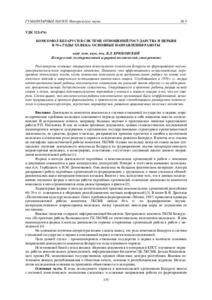Please use this identifier to cite or link to this item:
https://elib.psu.by/handle/123456789/13732Full metadata record
| DC Field | Value | Language |
|---|---|---|
| dc.contributor.author | Крюковский, В. Д. | - |
| dc.date.accessioned | 2015-09-24T08:21:12Z | - |
| dc.date.available | 2015-09-24T08:21:12Z | - |
| dc.date.issued | 2015 | - |
| dc.identifier.citation | Вестник Полоцкого государственного университета. Серия A, Гуманитарные науки. - 2015. - № 9. – C. 135-143. | ru_RU |
| dc.identifier.issn | 2070-1608 | - |
| dc.identifier.uri | https://elib.psu.by/handle/123456789/13732 | - |
| dc.description | Komsomol of Belarus in the Relation System Between a Church and a State in the 70-Ies of the Twentieth Century: the Main Directions of Operation. U. Krukouski, Cand. History, Associate Professor (Belarusian State Agrarian Technical University) | ru_RU |
| dc.description.abstract | Рассмотрены основные направления деятельности комсомола Беларуси по формированию научно- материалистического мировоззрения молодежи. Показано, что эффективность осуществляемых мероприятий достигалась тогда, когда комитеты комсомола вели воспитательную работу на основе комплексного подхода и творческого использования накопленного опыта. Углублявшийся в 1970-е гг. отрыв идейно-воспитательной работы комсомольских комитетов от реальной жизни обрекал ее на абстрактное просветительство, беспредметную словесность. Утвердившиеся в практике работы разрыв между словом и делом, лакировка действительности порождали у юношей и девушек неверие в то, что им говорили. Сделан вывод, что атеистическая работа комсомольских организаций была неэффективной, зачастую превращалась в простую формальность и практически мало способствовала расширению политического и культурного кругозора, укреплению мировоззрения, развитию нравственных качеств у молодежи.= the main directions of Komsomol operation of Belarus to form scientific and materialistic youth outlook were created at the studied period. Positive results were achieved in some areas. the efficiency of carried out activities was achieved when Komsomol Committees were performing educational work based on a complex approach and creative use of the gained experience. in the 1970th the separation of ideological-educational work of Komsomol Committees from real life led to its abstract enlightenment objectless literature. the established in a practice gap between a word and an action, gloss of reality originated a disbelief in what was said among the youth. As a result atheistic work of Komsomol bodies wasn’t efficient and frequently turned into a simple formality and practically didn’t contribute to the development of political and cultural outlook, as well as moral qualities of the youth. | ru_RU |
| dc.language.iso | ru | ru_RU |
| dc.publisher | Полоцкий государственный университет | ru_RU |
| dc.relation.ispartof | Веснік Полацкага дзяржаўнага ўніверсітэта. Серыя А, Гуманітарныя навук | be_BE |
| dc.relation.ispartof | Herald of Polotsk State University Series A, Humanity sciences | en_EN |
| dc.relation.ispartof | Вестник Полоцкого государственного университета. Серия A, Гуманитарные науки | ru_RU |
| dc.relation.ispartofseries | Серия A, Гуманитарные науки;2015. - № 9 | - |
| dc.rights | open access | ru_RU |
| dc.subject | Государственный рубрикатор НТИ - ВИНИТИ::ОБЩЕСТВЕННЫЕ НАУКИ::История. исторические науки | ru_RU |
| dc.subject | История БССР | ru_RU |
| dc.subject | идеологическая работа ЛКСМБ | ru_RU |
| dc.subject | комсомольские организации Белоруссии | ru_RU |
| dc.subject | атеистическое воспитание молодежи | ru_RU |
| dc.title | Комсомол Беларуси в системе отношений государства и церкви в 70-е годы ХХ века: основные направления работы | ru_RU |
| dc.type | Article | ru_RU |
| dc.identifier.udc | 322(476) | - |
| Appears in Collections: | 2015, № 9 | |
Files in This Item:
| File | Description | Size | Format | |
|---|---|---|---|---|
| 135-143.pdf | 264.43 kB | Adobe PDF |  View/Open |
Items in DSpace are protected by copyright, with all rights reserved, unless otherwise indicated.